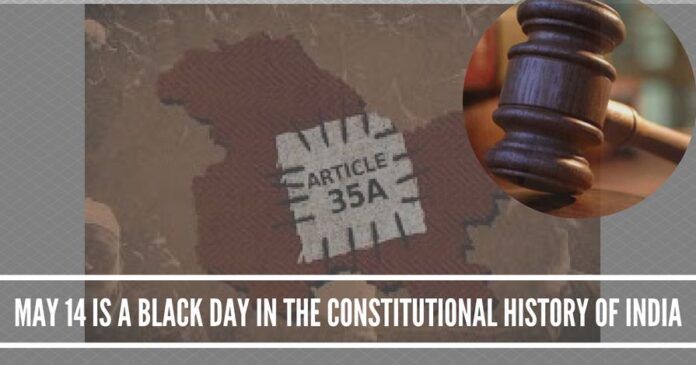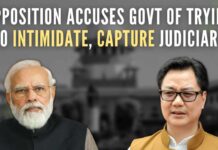
It is this Article 35-A that has hurt all the non-J&K residents in the country in general and refugees from Pakistan and the whole lot of women-folk in the state, in particular,
There are many factors which have added to the anger of the people of Jammu province. Their anger is directed both against the BJP-led Union Government and the Jammu and Kashmir BJP, which is coalition a partner of the Mehbooba Mufti-led government. I skip all other factors and focus only on the immediate provocation, which is grave by any standard. The case in point is the unity among all the Kashmiri leaders, “mainstream” and separatists included, and the seemingly full support of the Union Government to the Mehbooba Mufti government against all the non-J&K residents and the marginalised women-folk and Hindu-Sikh refugees from Pakistan and the statements which Farooq Abdullah and his son Omar Abdullah (leader of opposition in J&K legislative assembly), Chief Minister Mehbooba Mufti and Congress leaders like Saif-ud-Din Soz have made.
Chief Minister Mehbooba Mufti has even crossed the red line when she went all the way from her official residence to the residence of Farooq Abdullah to discuss ways and means of protecting Article 35-A – a meeting which sprang a big surprise on all given the fact that the PDP and the NC were arch political rivals. This has changed the whole scenario in the state and added more fuel to the burning fire in Jammu.
What is Article 35-A all about? What does it provide for? Article 35-A declares all Indians persona-non-grata in Jammu and Kashmir. Under this atrocious Article, no Indian, not even the Union President and Prime Minister can buy an inch of land in the State
They have in one voice threatened that any move to tinker with Article 35-A of the Indian Constitution would trigger “greater violence” in Kashmir. They insist that the people of Jammu and Ladakh have no other option but to fall in line. They have threatened that “there would be nobody in Kashmir to give his shoulder to the national tri-colour if Article 35-A was tinkered with” even slightly. Again, they have in one voice said that those demanding revocation of Article 35-A are those who want to change Kashmir’s demographic composition and erode the distinct identity of Kashmiri Muslims. (Kashmir is now 99.99 percent Muslim.) It is just a spurious charge.
Article 35-A was applied to J&K in a hush, hush manner on 14 May 1954 through a presidential order. Nehru’s government didn’t invoke Article 368 to amend the Constitution. To be more precise, the Nehru government bypassed the Parliament and applied it to Jammu and Kashmir. It is not part of the main body of the Constitution; it finds mention only in an appendix.
What is Article 35-A all about? What does it provide for? Article 35-A declares all Indians persona-non-grata in Jammu and Kashmir. Under this atrocious Article, no Indian, not even the Union President and Prime Minister can buy an inch of land in the State. In effect, Article 370 creates a high wall between the people of Jammu and Kashmir and the rest of Indians.
Article 35-A gives absolute, unbridled and extraordinary power to the Jammu and Kashmir government to grant or not to grant citizenship rights to any Indian or a group of Indians. In addition, no Indian can acquire education and get government scholarship in the state. Let me quote verbatim the text of Article 35-A to put things in perspective. It reads as under:
“Notwithstanding anything contained in this Constitution, no existing law in force in the State of Jammu and Kashmir, and no law hereafter enacted by the Legislature of the State:
(a) defining the classes of persons who are, or shall be, permanent residents of the State of Jammu and Kashmir; or
(b) conferring on such permanent residents any special rights and privileges or imposing upon other persons any restrictions as respects —
(i) employment under the State Government;
(ii) acquisition of immovable property in the State;
(iii) settlement in the State; or
(iv) right to scholarships and such other forms of aid as the State Government may provide, shall be void on the ground that it is inconsistent with or takes away or abridges any rights conferred on the other citizens of India by any provision of this part.”
The Union Government and the Supreme Court would work in tandem to protect the Preamble of the Indian Constitution, which provides for equal rights to all living across the nation in all the states of the Union.
It is this Article that has hurt all the non-J&K residents in the country in general and refugees from Pakistan and the whole lot of women-folk in the state in particular. There are almost 2 lakh Hindu-Sikh refugees from Pakistan living in Jammu since their migration from adjoining Pakistan’s Sialkot in 1947. They do not have the right to property, right to education, right to government jobs, right to vote and right to a bank loan. They are Indian nationals, but not citizens of the state. They have been crying for justice since decades but without any result.
As far as the women-folk in Jammu and Kashmir are concerned, their choice of marriage is restricted. If a daughter of state marries a non-permanent resident of the state, her children and husband can’t exercise any right in the state. Their status becomes similar to the status of refugees from Pakistan.
Several petitions have been filed in the Supreme Court against Article 35-A. The latest being the one filed on May 1, 2018, by Radhika Gill, a top Jammu & Kashmir athlete; Eklavya, MA in Political Science from Jammu University; and Vijay Kumar – residents of Valmiki Colony, Gandhi Nagar, Jammu. Radhika Gill, Eklavya and Vijay Kumar submitted that the petition had been filed on behalf of more than 40,000 persons belonging to the second, third and fourth generations of 272 safai karamcharis (sweepers) who moved from Gurdaspur and Amritsar in Punjab and settled in Jammu way back in 1957 on the request of the then Jammu & Kashmir Government to work as sweepers to replace the sweepers of the Municipal Corporation of Jammu, who had gone on an indefinite strike. Their plea was that the Jammu & Kashmir Government had gone back on its commitment and that they were eligible only for the sweepers’ job.
The upshot of their whole petition was that they had been “denied the right to seek admission in the state-funded medical, engineering and B.Ed colleges; right to employment in the state government; right to acquire property; and right to vote, despite the fact that they had been residing in the state since their birth” and that “they were the descendants of few persons among the 272 safai karamcharis, who were brought to Jammu by the Jammu & Kashmir Government in 1957”.
The petition came up for hearing before a bench headed by Chief Justice of India Dipak Misra, which said the “matter involved interpretation of constitutional provisions and should be clubbed with other petitions on the issue. Coincidently, it fixed the next date of hearing on May 14, the day the adversely affected people in Jammu & Kashmir call it a “black day in the constitutional history of India”.
Earlier on October 30, 2017, the Supreme Court had deferred hearing on petitions challenging the validity of Article 35-A at the behest of the Union Government. Attorney General KK Venugopal had then told the apex court that the “Government of India had appointed Dineshwar Sharma as an interlocutor” and requested it to adjourn the matter for “six months”. Besides, the Attorney General had also told the apex court that the “Union Government didn’t want to file its affidavit in response to the petitions filed by Delhi-based NGO ‘We the Citizens”. It had challenged the constitutional validity of Article 35-A on the ground that the President could not have amended the Constitution by an Order in 1954.
One can only hope and pray that good sense would finally prevail and the Union Government and the Supreme Court would work in tandem to protect the Preamble of the Indian Constitution, which provides for equal rights to all living across the nation in all the states of the Union.
Note:
1. The views expressed here are those of the author and do not necessarily represent or reflect the views of PGurus.
- ‘Kashmir My core constituency’: Revisiting July 12, 2003 to understand politics, Omar Abdullah-style - March 15, 2024
- Total deviation from traditional approach: Seven takeaways from PM Modi’s March 7 Srinagar visit - March 9, 2024
- Status of political parties: Why is further J&K reorganization imperative? - March 1, 2024











I deeply feel it is just a matter of time. BJP will do it and will have to do it, they had to promise for starters not to fiddle with these as they are setting up other things to get entry and get stable and will hit when the time is right. will want to say that they have given a fair chance to take necessary action. what other options is left out as this cannot go on forever like this. they are exploiting all the facilities and above all crying wolf.
they (the J&k establishment) are exploiting all the facilities and above all crying wolf.
I really wish BJP takes this seriously… because most of the other states don’t even know this.
If all states(or people) demand scraping that article, this could materialise.
Atleast this issue should be discussed all over India and supreme court should give appropriate judgement.
That is why 500,000 Indian Army personnel live permanently in Kashmir besides many thousand members of various Central Police Force(s)
It is all fine to rant against Nehru and his ilk. But do you people really think that Modi will lift his little finger on this matter (or some other matter where Hindus are hurt the most)? If you do, then contact me. I have a bridge to sell for INR 10. Be it economic or social, constitutional or judicial, Kashmir or the rest of India, Modi is more Nehruvian than Nehru himself. That also explains why the CongIs are in a rage.
I feel immensely depressed after reading this article. Abusing Nehru is not going to solve this problem. What we need is a collective protest from all states and the protest should be assertive similar to Jaiprakash movement of Sampurna Kranti
So what is the way to get rid of this?
Who can do it?
What is needed to get this removed?
How can the public help?
What is not being done by the current BJP Govt in this front?
Kashmiris also should not be allowed to buy property outside India
Muslim nehru was a bastard son of a muslim and a traitor. Remve his name from our history books. Muslim thug Nehru created an anti Indian indus water treaty and it should also be scrapped. Article 35-A declares all Indians persona-non-grata in Jammu and Kashmir. Under this atrocious Article, no Indian, can buy an inch of land in the State Commission should investigate the muslim nehru family for sabotaging India. bit.ly/2JiTkIe Indus treaty treachery by Nehru
Hmm… Emotional yet true.